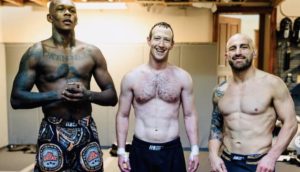“It’s also good to know that you can kill people,” Joe Rogan opined in his podcast interview with Facebook CEO Mark Zuckerberg as the men began to giggle.
“There’s a certain confidence from that,” Zuckerberg affirmed.
“If you could sell it in a pill, everybody would buy it,” Rogan added. “No one would say, ‘I’d like to be the vulnerable guy walking around with a bunch of fucking assassins.”
As Zuckerberg recalled entering the jiu-jitsu ring for his first tournament, using his first and middle name while wearing sunglasses, a hat and a COVID mask to disguise himself, he said martial arts awakened something within him.

In 2023, Mark Zuckerberg posted on Instagram a photo of him posing with Israel Adesanya and Alex Volkanovski, legendary Jiu Jitsu champions.
“It’s like you want like feminine energy. You want masculine energy,” he told Rogan. “You’re going to have parts of society that have more of one or the other. I think that’s all good. But I do think the corporate culture sort of had swung toward being this somewhat more neutered thing. And I didn’t really feel that until I got involved with martial arts, which I think is still a much more masculine culture.”
Rogan replied, “That’s how you become successful at martial arts. You have to be at least somewhat aggressive.”
Then Zuckerberg reflected, “There are like a few of these things throughout your life where you just have an experience and you’re like, ‘Where has this been my whole life?’ And it just turned on like a part of my brain that I was like, ‘OK, yeah, like this was a piece of the puzzle that should have been there and I’m glad it now is.’”
Of course, these views of masculinity in the workplace have been around a long time in conservative Christianity. Traditional Catholic men like Kansas City Chiefs kicker Harrison Butker and Vice President-elect JD Vance have led the conversation this past year over whether women should even be in the workplace to begin with or if they should get married, stay home and make a bunch of babies. But since men and women are all in the workplace together, Rogan and Zuckerberg, neither of whom is a Christian, suggested we need to move toward a more aggressively masculine work environment. It’s almost as if all these men have been reading Desiring God or The Gospel Coalition.
Mature masculinity and femininity at work
For men like John Piper of Desiring God, masculinity and femininity in the workplace means ensuring women are never allowed to be in charge of men.
“To the degree that a woman’s influence over man is personal and directive it will generally offend a man’s good, God-given sense of responsibility and leadership, and thus controvert God’s created order,” Piper claims.
Piper suggests workplace environments that maintain proper masculine hierarchies while allowing women to have some level of authority must be either “personal and non-directive” or “directive and non-personal.” For example, he says, “A woman who is a civil engineer might design a traffic pattern in a city so that she’s deciding which streets are one-way, and therefore she is influencing, indeed controlling in one sense, all the male drivers all day long. But this influence is so non-personal that it seems to me that the feminine/masculine dynamic is utterly negligible in this kind of relationship.”
In contrast, Piper says, “If a woman’s job involves a good deal of directives toward men, they’ll need, in general I think, to be non-personal, or men and women won’t flourish, I don’t think, in the long run in that relationship without compromising profound biblical and psychological issues.”
Thus, to Piper, having the proper balance of masculine and feminine energies in the workplace means women never should be police officers, military officers or even managers of men.
How masculinity hierarchies fuel aggression
Of course, Rogan and Zuckerberg likely have not read any Piper books and might object to Piper’s ridiculous, sexist ideas. But their claim that masculinity is being neutered in the workplace and their response of embracing aggression reveals they share at least a subconscious assumption about masculinity hierarchies with Piper that are quite common in today’s culture.
A study by Sage Journals found that “unlike womanhood, manhood is widely viewed as a status that is elusive (it must be earned) and tenuous (it must be demonstrated repeatedly through actions).”
“The masculinity supremacy hierarchies Piper sacralizes are embedded in the subconscious assumptions of American men.”
This is because the masculinity supremacy hierarchies Piper sacralizes are embedded in the subconscious assumptions of American men. The culture considers womanhood to be static, while manhood is something to be achieved, a ladder to climb.
According to the American Psychological Association, this means “men experience more anxiety over their gender status than women do, particularly when gender status is uncertain or challenged.”
Thus, Harvard Business Review says, “Masculinity is among the most fragile of identities, so precarious that even seemingly minor threats can push otherwise-ethical men to lie, cheat, harass and even commit assault, all in an attempt to prove that they’re ‘real men.’”
The journal adds: “When men feel that their gender identity is being questioned or threatened, they are much more likely than women to respond by reasserting that identity through aggressive thoughts and harmful, toxic behaviors.”
Emasculated men and neutered culture
“I do think a lot of our society has become very … neutered or emasculated,” Zuckerberg asserted with Rogan.
And how do women feel about this?

In 2022, Joe Rogan posted images of himself on Instagram to show how he got back in shape. (Photo: Instagram)
“I do think that if you’re a woman going into a company, it probably feels like it’s too masculine,” Zuckerberg admitted. “It’s like there isn’t enough of the kind of energy that you may naturally have. And it probably feels like there are all these things that are set up that are biased against you. And that’s not good either because you want women to be able to succeed and have companies that can unlock all the value from having great people no matter what their background or gender.”
But apparently, Zuckerberg thinks women aren’t seeing the full picture like men are. He added, “But I think these things can always go a little far. And I think it’s one thing to say we want to be kind of like welcoming and make a good environment for everyone. And I think it’s another to basically say that masculinity is bad. And I just think we kind of swung culturally to that part of the spectrum where it’s all like, ‘OK, masculinity is toxic. We have to get rid of it completely.’”
“Having a culture that like celebrates the aggression a bit more has its own merits that are really positive,” Zuckerberg suggested. “And that has been a kind of positive experience for me just like having a thing that I can just like do with my guy friends and it’s just like we just like beat each other a bit.”
In martial arts, Rogan said, you have “someone trying to choke you unconscious.”
So Zuckerberg added that business is the same way, only in the workplace, “you have someone trying to choke you unconscious slowly over a multi-month multi-year period.”
Violent metaphors about beating and choking aside, why would Zuckerberg and Rogan identify masculinity exclusively with violent aggression? And why would they not assume femininity is “at least somewhat aggressive”?
Masculinity, muscles and moonlight
One way conservative pastors like Piper would agree with Rogan and Zuckerberg is regarding their assumptions about physical exertion, aggressiveness and masculinity.
In Recovering Biblical Manhood and Womanhood, Piper and Grudem write: “Consider what is lost when women attempt to assume a more masculine role by appearing physically muscular and aggressive. It is true that there is something sexually stimulating about a muscular, scantily clad young woman pumping iron in a health club. But no woman should be encouraged by this fact. For it probably means the sexual encounter that such an image would lead to is something very hasty and volatile, and in the long run unsatisfying. The image of a masculine musculature may beget arousal in a man, but it does not beget several hours of moonlight walking with significant, caring conversation. The more women can arouse men by doing typically masculine things, the less they can count on receiving from men a sensitivity to typically feminine needs.”
“Rogan and Zuckerberg want to move workplace culture as a whole back toward aggressive, assassin-like masculinity.”
Piper’s language about “typically feminine needs” sounds exactly like Zuckerberg’s language to women about “the kind of energy that you may naturally have.” It’s playing into stereotypes, which fuel masculine fragility.
Also, notice the spectrum. According to complementarianism, in one corner is masculinity, described as muscular and aggressive with metaphors of pumping iron, as if that in any way characterizes Piper and Grudem. In the other corner is femininity, described as feeling cared for in the moonlight.
Similarly, according to Rogan and Zuckerberg, in one corner is masculinity, described as aggressive and assassin-like with metaphors of beating and choking, while in the other corner is femininity, described as vulnerable.
While Piper and Grudem want to keep men and women on opposite sides of the spectrum, Rogan and Zuckerberg want to move workplace culture as a whole back toward aggressive, assassin-like masculinity, while admitting they think it’s unnatural for women.
And perhaps Piper may have accidentally said it best by suggesting men may get aroused by “masculine musculature.” Despite Piper’s opposition to LGBTQ people, he’s essentially admitting there is a homoeroticism inherent to complementarianism in that what excites patriarchal men is the sight of patriarchal men. So it makes sense that these violently aggressive men would create a god and a gospel that reflects violently aggressive masculinity.
A gospel of masculine aggression
“Some emergent types (want) to recast Jesus as a limp-wrist hippie in a dress with a lot of product in his hair, who drank decaf and made pithy Zen statements about life while shopping for the perfect pair of shoes,” megachurch pastor Mark Driscoll once told Relevant Magazine. “In Revelation, Jesus is a pride fighter with a tattoo down his leg, a sword in his hand and the commitment to make someone bleed. That is a guy I can worship. I cannot worship the hippie, diaper, halo Christ because I cannot worship a guy I can beat up.”
It’s unclear whether Driscoll would consider Zuckerberg to be sufficiently masculine enough, given Zuckerberg’s fighting debut while showing up with sunglasses, a hat and a COVID mask disguise. He probably would prefer a Jesus more like Joe Rogan, who thinks it’s good to know you can kill people.
But Driscoll isn’t some extremist out on the margins here. The highly respected late R.C. Sproul applied violent, aggressive masculinity to the gospel itself.
“You will resist it as hard as you can. But God will overcome your resistance. When God chooses to save somebody, in his sovereignty, he saves them,” Sproul said. Then he added, “Edwards called it ‘the holy rape of the soul.’ Some people are violently offended by that language. I think it’s the most graphic and descriptive term I can think of, of how I was redeemed.”
Is it any wonder that the United States has a problem of violent aggressive masculinity, when its conservative politicians like Trump and Vance, its entertainment and technology leaders like Rogan and Zuckerberg, and its pastors like Piper, Grudem, Driscoll and Sproul all promote a move toward masculinity defined by violent aggression that Sproul sees as rooted in a gospel best reflected in rape?
A powerless Christianity
In his interview with Relevant Magazine, Driscoll said, “I fear some are becoming more cultural than Christian.”
But ironically, in his latest newsletter, Driscoll is partnering with an even more toxic social media billionaire and non-Christian cultural icon, Elon Musk.
“Win a Starship Torch!” the header begins with a picture of Driscoll pointing back at Musk, who is giving a thumbs up with his exploding rocket in the background.
“Why do we giveaway torches, trucks and flamethrowers?” Driscoll asks. “Because unbelievers may not line up for Bible teaching, but they’ll line up for something this epic. They come for the prize, and by God’s grace, stay for the gospel.”
Why would a pastor resort to such snake-oil shenanigans?
Besides the fact that his gospel apparently isn’t good enough news, I would suggest, based on peer-reviewed research, that these aggressive tactics are driven by fragile men attempting to prove they’re “real men.” After all, Driscoll’s personal brand is “Real Men” and “Real Faith.”
By speaking the same language as Rogan and Zuckerberg, evangelical patriarchs offer no transformative message to our culture. Instead, by promoting male headship, embracing aggression and defining the gospel as sexual assault, they reveal their fragility and push violent, aggressive masculinity to an extreme that even Rogan and Zuckerberg probably wouldn’t affirm. Their gospel and their view of masculinity offers men no transformation and thus offers women no good news. In an effort to sacralize their own power, they present to a fragile culture a powerless Christianity.
Rick Pidcock is a 2004 graduate of Bob Jones University, with a bachelor of arts degree in Bible. He’s a freelance writer based in South Carolina and a former Clemons Fellow with BNG. He completed a master of arts degree in worship from Northern Seminary. He is a stay-at-home father of five children and produces music under the artist name Provoke Wonder. Follow his blog at www.rickpidcock.com.
Related articles:
How I learned to stop obsessing over lust and you can too | Opinion by Rick Pidcock
The death of truth | Opinion by Mark Wingfield





